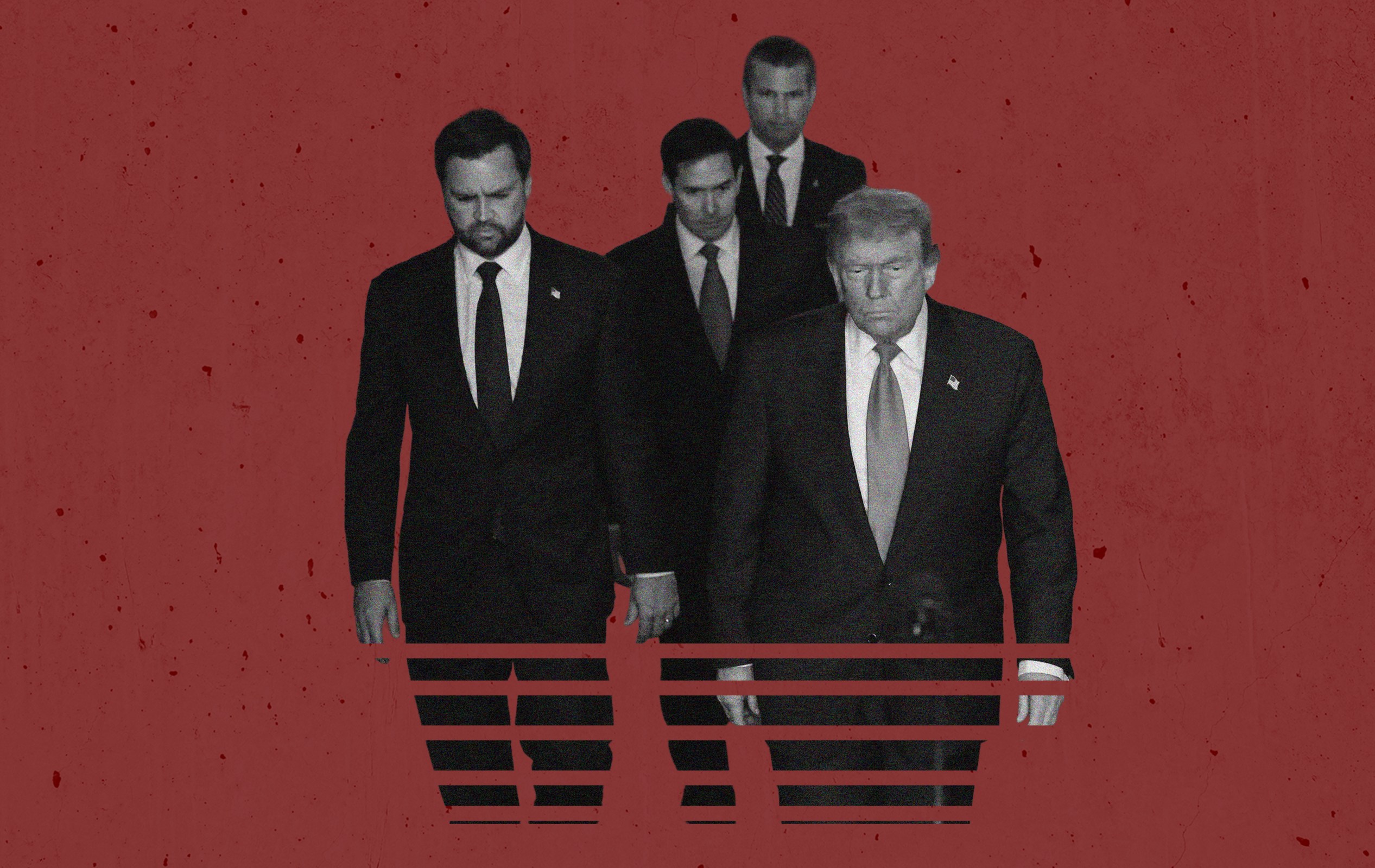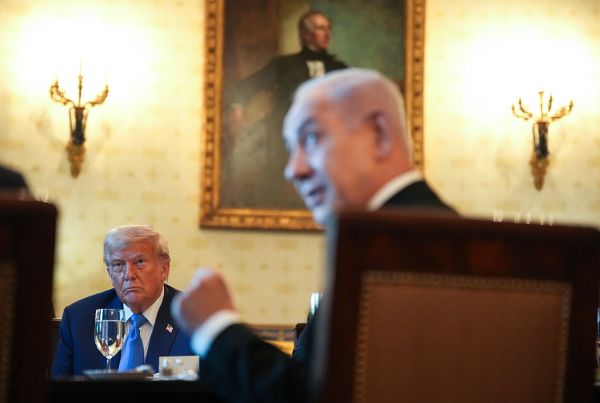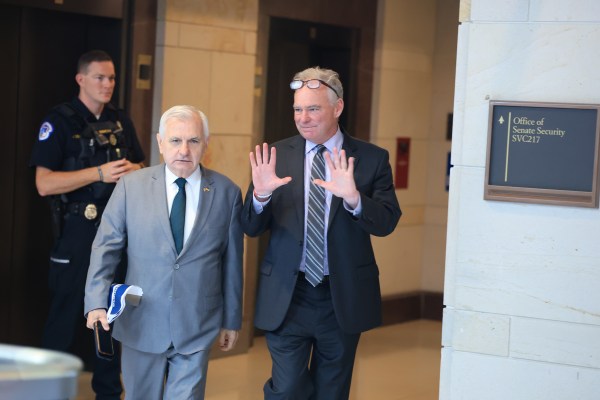“Right Move, Wrong Team,” said David Frum about this weekend’s U.S. attack on Iran. I take his point. But who would have been the “right team”?
Not Kamala Harris’ team. There’s little chance her administration would have joined an Israeli-led war after many months of left-wing outrage over Gaza. Not Joe Biden’s or Barack Obama’s teams, either. They were too invested in rapprochement with the Iranians to ever support military strikes.
George W. Bush’s team? It had its chance in Iraq to prove that it could effectively manage a conflict the administration initiated. Oh well.
Maybe Frum means Donald Trump’s first-term team, which began with the likes of James Mattis overseeing the military instead of a dissolute former Fox & Friends host. But even a more capable Trump administration is still a Trump administration. Being surrounded by hawks in 2019 didn’t prevent the then-president from canceling airstrikes on Iran 10 minutes before the operation was to begin.
Frum must be imagining a team led by a more competent Republican president, someone in the hawkish Nikki Haley mold or the smart-but-cynical populist Ron DeSantis niche. As I explained on Thursday, though, either would have faced serious political difficulties in attacking Iran. Democrats would have rallied against another Middle Eastern war of choice and Trump’s cultish base would have lashed the new GOP leader for betraying “America First.” It’s hard to start a war when two-thirds of the country is rooting for you to fail from the jump.
The terrible truth is that the current team is the “right team” to strike Iran because it’s the only team capable of building a respectable-ish level of public support for doing so. Only Nixon could go to China, only Trump could bomb Natanz.
As a non-paying reader, you are receiving a truncated version of Boiling Frogs. You can read Nick’s full newsletter by becoming a member here.
One peacenik MAGA “influencer” after another dutifully lined up behind the president on social media once the bombs fell on Saturday night, sometimes in comically hypocritical ways. No other Republican (and certainly no Democrat) in 2025 could have proceeded with something as hair-raising as a bunker-buster bombardment of Iran’s nuclear program confident that the American right—or most of it, anyway—would hang together afterward.
And as a matter of pure nerve, Trump 2.0 might be the only administration that could have done it. The president is term-limited, is fresh off a national popular vote victory last fall, and is now staffed to the gills with yes-men who will assure him that his instincts are correct no matter what. To start a war with Iran requires self-confidence bordering on recklessness with two scoops of stupidity tossed in. That’s our government. Like it or not, Trump’s team is the “right team.”
The Iran strikes are a microcosm of American global leadership in the twilight of the Pax Americana. On the one hand, the United States is still the only country that can project devastating military power halfway around the world on short notice. On the other, no one trusts the United States anymore to manage an international crisis competently, especially not when it’s under an administration as kooky and volatile as Trump’s. We’re a kakistocracy at war, a monkey with a hand grenade.
What happens now that the pin has been pulled?
Mad men.
The upside of populists’ belief in ruthlessness as an ethic of government is that it can be lethal to America’s enemies.
By every account, Saturday’s airstrikes did serious damage to Iran’s nuclear program. Wherever the regime stood in the process of building a nuclear weapon before the bombs fell, they stand further away now. And to give Trump some credit for once, he was less reckless in attacking than he may have appeared. Reportedly the “two weeks” timeline he gave for deciding was a deliberate subterfuge to get the Iranians to lower their guard, and he asked the Israelis to soften up Iran’s air defenses before the U.S. struck in order to reduce the risk of American casualties.
If Iran ends up being cowed by the president’s threats of “regime change” into standing down with minimal retaliation—and conflicting reports about a ceasefire between Iran and Israel emerged just before this newsletter was sent—it’ll be an unusual case of Trump successfully executing “the madman theory” of foreign relations. That’s his favored approach toward domestic enemies, getting them to cooperate out of fear of what he might do if they don’t, but he’s tended not to follow it abroad. (His patience with Russia is limitless, for instance.) Saturday night was a momentous exception.
If the attack ends up scaring Iran into negotiating an end to its nuclear program, it’ll be a great victory for the deterrent virtues of Jacksonian populism. Perhaps Xi Jinping, having experienced firsthand recently Trump’s willingness to demonstrate bravado by escalating recklessly, is watching and reflecting that one antagonizes a monkey with a hand grenade at one’s peril.
Nuclear disarmament of Iran by force or by diplomacy, without U.S. casualties, is the best-case scenario for this conflict. And the sooner it happens the better, as any complications will force Trump and his team into new conundrums about whether to escalate to compel Iran’s compliance or to back down without achieving their goals.
The thing is, there already have been complications.
There’s reason to believe Iran’s stockpile of highly enriched uranium survived the U.S. attack. Israeli officials told the New York Times of evidence that the Iranians “removed 400 kilograms, or roughly 880 pounds, of uranium enriched to 60 percent purity” from the Fordow site in the days before it was bombed. They were “attuned to Mr. Trump’s repeated threats to take military action,” it seems, which tends to undermine the brilliance of the president’s “two weeks” ploy. (Allegedly, the Pentagon even dispatched a decoy fleet of B-2 bombers because the brass had begun “to worry that Mr. Trump was giving Iran too much warning about an impending strike.”) In a kakistocracy, the White House can’t resist telegraphing its moves even when it’s engaged in a feint.
Another problem is that Fordow, although heavily damaged, appears not to have been completely destroyed. If so, the Iranians might bring it back online sooner than the Pentagon expects. Even if they can’t, they reportedly still retain the ability to manufacture new centrifuges at an unbombed site near Natanz and had already begun constructing a new uranium enrichment facility deep underground at Isfahan, where U.S. bombs on Saturday couldn’t reach. If that’s true then Iran is still in the bomb-building business, unless and until that 880 pounds of uranium is coughed up.
Meanwhile, as I write this, the regime has begun to fire at America’s military base in Qatar. It looks to be token retaliation from the early reports, with only a dozen missiles launched, but any American casualties will mean a new crisis. And if the Iranians make good on their threats to bottle up commercial shipping by closing the Strait of Hormuz, that too will probably need to be un-bottled by force.
Dilemma, dilemmas: Should Trump bomb Fordow to “finish it off” or send bunker-busters instead to Isfahan, which may be impregnable? Should he ignore Iran’s missile volley at Qatar in the name of deescalation, as he seems inclined to do, or hit back harder than he did on Saturday to reinforce the “madman” approach? How does he plan to get hold of Iran’s uranium without negotiating for it—and if he does intend to negotiate for it, why continue to antagonize the other party with more strikes?
These would be hard questions even for a competent administration. But for a kakistocracy simultaneously obsessed with looking strong and with making deals, they’re maddening. This standoff can’t end with Iran still capable of making nukes in the near term or else Trump’s (and Israel’s) daring raid failed. Yet if it doesn’t end soon, the president’s pretensions of ending “forever wars” may go completely sideways.
What’s an administration that’s somehow pro-war and anti-war to do?
The bitter and the sweet.
Scaring the bad guys and uniting the right behind the war effort are the sweeter elements of “madman” populism, but the bitter ones are what led Frum to pronounce this the wrong team to lead a war against Iran. The president is image-obsessed; some of his key deputies are incompetent; they’re beholden to “America Firsters” who despise Reaganite notions of allies and enemies; and they’re more willing by dint of their postliberal outlook to sustain an illegal war of choice.
Image: One of the things that got Trump excited about bombing Iran was his favorite network being rah-rah about the Israeli campaign. “The president was closely monitoring Fox News, which was airing wall-to-wall praise of Israel’s military operation and featuring guests urging Mr. Trump to get more involved,” the Times reported. “Several Trump advisers lamented the fact that [Tucker] Carlson was no longer on Fox, which meant that Mr. Trump was not hearing much of the other side of the debate.” If you want to influence life-and-death global affairs in a kakistocracy, you lobby the president through the TV.
Don’t underestimate how much a guy who’s preoccupied with strength and flattery might take a shine to flexing military muscles. Per the Times, Trump took “pride in both the [bunker-buster] bomb’s destructive power and the fact that the United States is the only country that has the bomb in its arsenal” in a conversation with an adviser. Now that he’s tried on the mantle of war president and seems to like the look, he likely won’t dare accept an outcome that arguably leaves him looking weak.
Incompetent: Last week Trump told reporters that he didn’t care that his own intelligence director, Tulsi Gabbard, believed that Iran hadn’t yet undertaken to build a bomb. He was asked about it again this weekend and bluntly replied, “She’s wrong.” As Jonathan Last said, if Trump is correct then it’s the greatest U.S. intelligence failure since Iraq; if he’s incorrect then he bombed Iran without justification. Either way, it means the president has no faith in Gabbard’s competence at a moment of utmost urgency. How she hasn’t resigned yet in embarrassment, I don’t know.
She may not be the only Cabinet member who’s been frozen out, either. Two U.S. officials told the Washington Post on Friday that Trump was discussing military options directly with Joint Chiefs chairman Dan Caine and CENTCOM commander Erik Kurilla, not with his secretary of defense. “Nobody is talking to [Pete] Hegseth,” one official claimed. “There is no interface operationally between Hegseth and the White House at all.” I don’t blame the president for not wanting to loop Hegseth in after the unpleasantness of this past spring (or for wanting him by his side for appearances’ sake on Saturday when he addressed the nation) but a competent commander-in-chief doesn’t saddle himself with military and intelligence leaders whom he doesn’t trust.
Beholden to isolationists: J.D. Vance is one of the brightest people in the White House, but even he can do only so much to square the circle of how an “America First” administration—which got elected by repudiating 40 years of Reaganite hawkery—ended up starting a war with an enemy whom every president since Reagan had avoided confronting. The point of postliberalism is to get right-wingers to question why they should regard authoritarian states like Iran as enemies. Now here was J.D., the great nationalist hope, forced to sell populists on why bombing Iran is good.
It’s an impossible task, which is why so many of his talking points this weekend ended up reading like lowbrow satire of its incoherence. “We’re not at war with Iran, we’re at war with Iran’s nuclear program,” Vance told Meet the Press, which, as others noted, would be like the Japanese insisting after Pearl Harbor that they’re at war with the U.S. Pacific Fleet, not with the U.S. Later the VP reassured Americans weary of Middle East entanglements that they needn’t worry this time due to a key difference between Trump and his predecessors. Those others were “dumb presidents,” he explained, and Trump is not. QED.
Then he threw the isolationist contingent a bone by vowing that the United States isn’t interested in regime change in Iran—only to have Trump float that very idea a few hours later, even punctuating it with “MAKE IRAN GREAT AGAIN.”
This is what it means to enlist in a movement where the leader’s daily impulses about strength and weakness have to be dressed up and presented as coherent strategy. Vance isn’t allowed to tell the truth: Yes, of course bombing Iran is inconsistent with MAGA isolationism, but Israel did the heavy lifting by breaking down Iran’s defenses and then tossed Trump an alley-oop right in front of the basket. You know the president—he can’t resist an easy dunk.
Illegal: Bombing Iran without congressional approval is so plainly illegal that no other president might have dared to do it. Other presidents have attacked enemies without legislative authorization, of course, Barack Obama most notably in recent years when he struck Libya in 2011. But given its size, capabilities, and regional influence, war with Iran is an order of magnitude more dangerous than airstrikes against a disintegrating Qaddafi regime. It’s easily the most perilous U.S. intervention since the invasion of Iraq.
To insist that Trump has the authority to invite that peril unilaterally, you’re stuck shrieking “whatabout Obama?!” or arguing that the president enjoys inherent power as commander in chief to force America into hostilities with any nation he chooses. Which can’t be true: If it were, it would strip the power to make war from the people, through their elected representatives, and hand it to a single individual. Of all the ways our government has become unaccountable to those it claims to serve, presidential unaccountability in sending U.S. troops to kill and die is the most pernicious.
For three reasons, it’s even more pernicious when it’s Trump. Because he’ll never face voters again (let’s hope!), he has no fear of public opinion. He also has no fear of impeachment, knowing that House and Senate Republicans are despicable cowards who won’t do their constitutional duties if it means crossing him. And if you want to get really dark, he might even find himself enjoying a national security crisis because of all the extra authority it would grant him to crack down on his enemies.
He has thousands of American troops still deployed in Los Angeles as I write this to keep the peace in a city that’s been quiet for weeks, doesn’t he? Being president during a national state of emergency would suit Trump temperamentally to a T.
The right team.
And so when David Frum says this is the wrong team to fight Iran, he’s making a point that’s sensible yet also delusional. The “wrong team” implies that there’s a right team, and I don’t think America’s capable of that anymore.
The best the United States can do to sustain such an effort is elect a populist kakistocracy because that’s now the only form of government capable of mustering the necessary political support and the persuasive ruthlessness needed to win. But, by definition, it’s also a government that can and probably will sabotage itself repeatedly due to incompetence, lawlessness, and ideological incoherence.
The most you can say for it is the same thing that’s always said in defense of populist rule, that the people who used to be in charge also weren’t so hot at their jobs. Either way, the free world would benefit from a Western-led, but not American-led, global order.










Please note that we at The Dispatch hold ourselves, our work, and our commenters to a higher standard than other places on the internet. We welcome comments that foster genuine debate or discussion—including comments critical of us or our work—but responses that include ad hominem attacks on fellow Dispatch members or are intended to stoke fear and anger may be moderated.
With your membership, you only have the ability to comment on The Morning Dispatch articles. Consider upgrading to join the conversation everywhere.